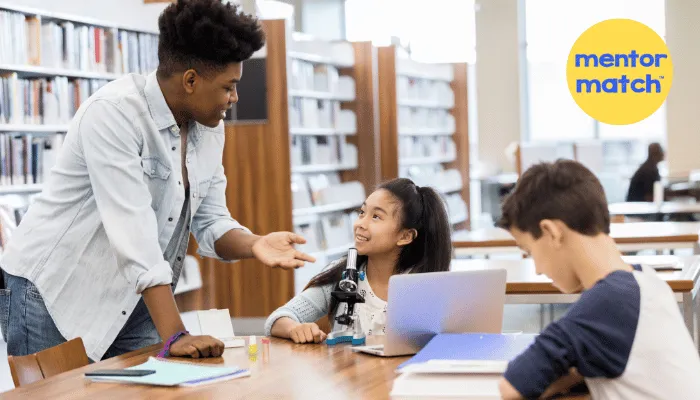
77.32% of parents see better grades in 3 months!
Something super important in your child’s school life—structuring tutoring sessions for your little learners in kindergarten through 5th grade!
You know how kids this age are just buzzing with energy and curiosity, right? Well, believe it or not, there’s a science to making the most out of their tutoring time. By customizing these sessions to fit their developmental stage and unique needs, parents can help turn their natural curiosity into a powerhouse of learning.
Have a ton of doubts and unsure where to begin?
Stick around as we dive into why it’s crucial to structure these sessions just right and how understanding your kids' developmental stages can make all the difference in their learning journey!
5 Super-Effective Strategies to Tutor Your Kids

Tutoring kids at home can be both a rewarding and challenging experience. More than just spending time together, it's about guiding them through their learning journey in a way that’s effective, enjoyable, and enriching.
In this preview, we'll introduce five super-effective strategies that can transform your tutoring sessions from mundane to magical.
- Understanding Your Child's Unique Learning Journey
Every child is a world of their own, with unique strengths, weaknesses, and learning styles. To provide effective tutoring, it's essential for parents to be aware of their child's individual needs.
- Open Communication: Talk to your child about their likes, dislikes, and challenges in math. Their perspective is crucial.
- Partner with the Teacher: Spend time with your child's teacher to gain insights into their performance, strengths, and areas needing improvement.
- Observe and Listen: Pay attention to your child's behavior when they're doing math. Are they easily frustrated, or do they approach problems with enthusiasm?
- Online Resources: Explore online assessments and learning platforms to gain additional insights into your child's learning style and knowledge gaps.
By combining these approaches, you'll create a clear picture of your child's needs, enabling you to find the perfect tutor and support their academic growth.
- Plan and Prepare Your Lessons
Planning and preparing lessons that cater specifically to young learners can significantly enhance their educational experience. Here’s how you can optimize each tutoring session:
- Tailor Lesson Plans to the Student's Needs
Think of each child as having a unique 'recipe' that makes up their learning style. Just as you might adjust a recipe to suit someone's taste, adjusting lesson plans to match a student’s learning preferences, strengths, and weaknesses ensures that they not only understand but also enjoy the learning process. This personalization can help concepts click faster and stay with them longer.
- Prepare Engaging Activities and Games
The joy you get when you try capturing a butterfly! The more vibrant the garden, the more likely you are to attract one.
Similarly, the more engaging and fun-filled your activities and games, the more likely you are to capture and hold your student's attention. Activities that stimulate curiosity and engagement can turn potentially dry topics into exciting learning adventures, making abstract concepts tangible and understandable.
- Use Homework as a Guide for Structuring Topics
Homework isn't just a tool for practice—it's like a map that shows where a student may need extra help or where they excel. Use this 'map' to tailor your lessons around the areas that need the most attention, ensuring that each session directly addresses these needs. This method makes the tutoring more effective by focusing on filling gaps and reinforcing strengths.
- Break Down Complex Subjects into Manageable Parts
Breaking down complex topics into smaller, digestible parts is like building a lego set. Each small piece is manageable on its own, but once you start putting them together, you start to see the big picture. This approach helps students tackle challenging subjects without feeling overwhelmed, boosting their confidence as they see their progress in real time.
- Create a Learning Haven
What if your child can have a space where learning is fun and stress-free? That's the goal!
Let's transform your child's study area into a cozy corner of concentration.
- Find Your Focus Spot: Choose a quiet, well-lit place where your child can spread out without distractions.
- Digital Detox: While technology is great, too much screen time can be overwhelming. Encourage breaks from devices during study time.
- Personal Touch: Add elements that make the space inviting, like favorite books, plants, or motivational quotes.
- Open-Door Policy: Let your child know you're available to help if needed, but also respect their need for quiet focus.
By creating a positive and supportive study environment, you're setting the stage for academic success.
- Make Learning an Adventure
Consider it’s a rainy Saturday afternoon, and instead of the usual movie marathon, you decide to pull out a treasure map, leading your child on an adventure right at your kitchen table. Each clue solved with numbers and shapes unlocks the next step, revealing hidden puzzles and games that teach math concepts.
This turns what might have been a dull day into an exciting quest, showing your child that learning math can be a fun and engaging journey!
In line with this scenario, make use of these interactive techniques to keep your child engaged and motivated:
- Real-Life Connections: Bridge the gap between textbook problems and everyday life. Use real-world examples to illustrate math concepts, making them relatable and meaningful.
- Game On: Turn learning into a fun competition with math games and puzzles. This adds an element of excitement and friendly rivalry.
- Student Choice: Give your child some control over their learning by offering options for problem-solving strategies or topics. This fosters a sense of ownership.
- Read Aloud and Act Out: Bring math stories to life through dramatic readings and role-playing. This multisensory approach helps solidify understanding.
Also Read: Unlocking the 7 Secret Methods: A Path to Effective Study
- Be Patient and Flexible
Patience and flexibility are key ingredients in the recipe for a successful tutoring session, especially with young learners.
Here’s how you can integrate these essential qualities into your teaching approach:
- Allow Time for Questions and Understanding
Think back to those long summer days spent learning to ride a bike. There was always time for questions like, "Why do I keep falling?" or "What if I go too fast?"
Similarly, in tutoring sessions, allowing ample time for students to ask questions and grasp concepts ensures they feel supported and confident. This open dialogue fosters a deeper understanding and a stronger student-teacher bond.
- Adapt Plans if the Student Doesn’t Understand
Remember playing video games and having to change strategies when one approach didn’t work?
Just like switching from offense to defense in a game, be ready to switch up your teaching strategies if a student isn't grasping a concept. Adapting lesson plans on the fly shows that you’re tuned in to their needs and committed to their success.
- Provide Breaks to Maintain Focus
Even the most thrilling marathon sessions of building a model airplane or a puzzle needed short breaks to keep the excitement alive.
Similarly, incorporate brief, energizing breaks during tutoring sessions to help maintain concentration. These pauses are like refresh buttons that can help students regroup and refocus, making learning more effective.
- Keep a Positive and Enthusiastic Attitude
Think of your favorite childhood movie and how the enthusiasm of the characters made you feel excited and engaged.
A tutor’s positive and enthusiastic attitude can have a similar effect, turning routine learning into an exciting adventure. This positive energy is contagious, often motivating students to adopt a similar attitude towards learning and overcoming challenges.
By weaving in patience and flexibility, along with a touch of nostalgia and relatable analogies, tutoring sessions can become not just educational but also deeply engaging and enjoyable for young learners.
To Summarize
What happens when parents encourage their children to take their first steps? Nurturing independent thinking is just as important. By teaching them to question, research, and solve problems on their own, you're equipping them with life-long skills.
Work together with your kids to cultivate curiosity, critical thinking, and a unanimous interest toward learning.
Ready to unlock your child's full potential? Why wait? Book a free 60-minute one-on-one session with Mentor Match and experience the difference personalized tutoring can make. Our expert tutors will ignite your child's passion for learning and guide them towards academic excellence.



.png)
.webp)
.webp)